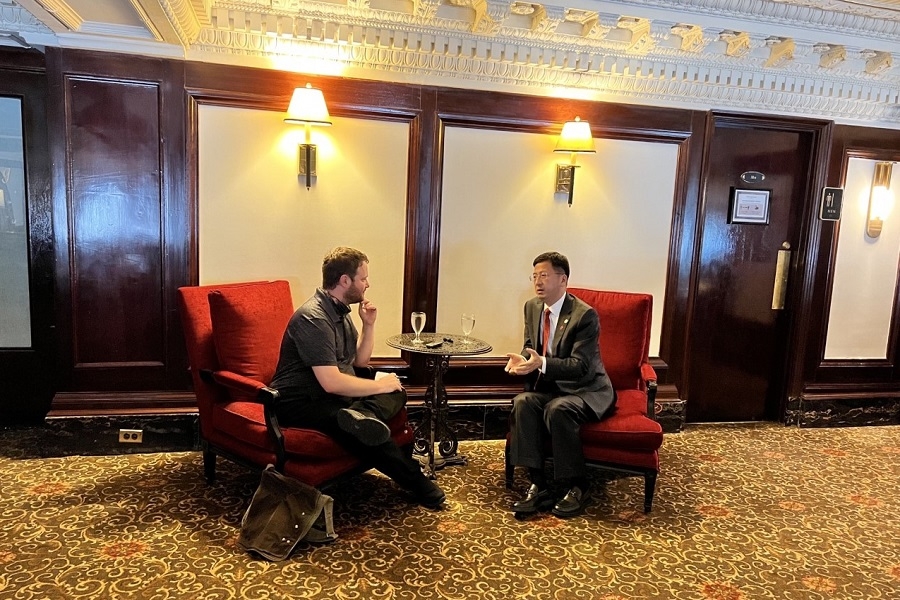The Chinese consul general to San Fransisco discusses how chilly U.S.-China relations will, and won’t, impact trade with Oregon.
Already-tense U.S.-China relations got tenser after House Speaker Nancy Pelosi’s August visit to the island of Taiwan, with China halting military and climate dialogue with the United States as a result.
Those tense interactions — which continued through Sunday as United States sent warships through the Taiwan Strait in what officials described as a routine transit — followed five years of trade disruption caused by the previous administration’s trade war and COVID-19.
China is Oregon’s largest international trading partner, accounting for 20% of Oregon’s export profits. The Oregon-China relationship also extends into research and development, especially regarding renewable energy technologies.
Last year, over 80 leaders in Oregon and China attended the Climate Change & Sustainability in Oregon & China Forum to foster collaboration environmental and climate change-related research. Chinese and Oregon universities continue to collaborate on agricultural and environmental research, including a carbon sequestration mapping and research project between the Chinese Academy of Sciences and Oregon State University.
Zhang Jianmin, China’s consul general to San Fransisco, who oversees trade relations between China and Oregon, spoke to Oregon Business in late August about Oregon-China partnerships.
This interview has been edited for length and clarity.
China has halted climate talks with the U.S. over House Speaker Nancy Pelosi’s visit to Taiwan. Will this tension impact Oregon-China partnerships?
At the national level, cooperation in certain areas is being pulled back. It really is a pity. China has suspended its cooperation and talks with the U.S. on climate change at the national level. But I think the exchanges between China and Oregon should go on.
The state of Oregon and China enjoy very close relationships and cooperation on climate change. Last year, the state of Oregon hosted the Climate Crisis and Sustainability Forum, which was a great success. And our national parks — the Crater Lake National Park, and China’s Wuyi Mountain National Park — celebrated the fifth anniversary of the sister park relationship last year. The exchange has produced developments in ecology and helped introduce more green technology.
Oregon State University and China’s Forestry University in Fujian compare notes, share information about how to better develop agriculture and how to better protect the forest industry.
The Oregon-China relationship has benefited from win-win cooperation, and I look forward to seeing more cooperation exchanges moving forward.
How does Oregon continue to shape U.S.-China relations?
Portland is the city of bridges, and in Oregon we have seen many bridges being built to foster cooperation. When it comes to China relations, Oregon has played a pioneering role. The state of Oregon has always been at the forefront of good exchanges and cooperation between China and the US, between China’s State of Oregon.
The state of Oregon accounts for more than 50% of the overall U.S. chip sales to China. So much of it is trade related. Nike also runs many outlets in China, and supports sponsors many sports events and teams, including the Chinese National Women’s Football Team.
The trade volume between China and the state of Oregon reached $13 billion US dollars last year, which was a 13% increase over 2020. We also saw many Chinese tourists coming to visits the Crater Lake National Park, and the City of Roses. Many Chinese students also come to study in Oregon.
I think sports is another area where people get closer and develop friendship. The World Athletic Championships were held this year in Eugene and Chinese athletes did very well. They won several medals. We are also very grateful that Chinese athletes were welcomed and accorded hospitality during the stay in Eugene. I think that event has promoted the state of Oregon internationally.
What will it take to improve China-U.S. relations, in your view?
China has, since the very beginning been the victim of the U.S. interference in China’s internal affairs. To resume dialogue and cooperation, it’s important for the one who caused the trouble to correct the mistake first. Taiwan is part of China. It has been a part of China for 2,000 years. It is not a separate country. It’s not a separate state.
Put yourself in China’s shoes. How would you react if another country insisted on supporting or encouraging certain states of the U.S., let’s say, Alaska, or Hawaii, to break away from its home country?
We lost Taiwan to Japan in 1895, because at that time, China was very weak. We were about to solve the problem, then the Korean War broke out. So basically, the problem became a problem at the time when China was very weak. And now, China is making progress. We are trying to achieve national reunification, and without Taiwan our national reunification won’t be complete.
In three joint communiques, the U.S. has publicly and solemnly promised that it will only keep commercial and cultural ties with people of Taiwan. But now, it has time and again, reversed its own promise. We ask the U.S. to correct the mistake by taking effective measures to come back to the one China principle, not just the word, but also in deed, this is of vital importance. There can be no compromise on this issue.
(Editor’s note: Taiwan’s status has changed numerous times throughout the centuries. The roots of the current dispute between the United States and China date back to the end of World War II, when the Allied Forces issued General Order No. 1, placing the island under control of the Republic of China. The 1952 Treaty of Taipei, a postwar peace treaty between Japan and China, states that all residents of Taiwan are nationals of the Republic of China. That agreement follows the 1951 San Francisco Peace Treaty between Allied Powers and Japan, which China did not sign. The San Francisco treaty did not formally determine the status of the island. Shortly after its signing U.S. Secretary of State John Foster Dulles said Japan had “merely renounced sovereignty over Taiwan,” but had not in fact ceded it to China.)
The United States recently passed the CHIPS Act, aimed at boosting domestic production of microchips, with the stated purpose of decreasing dependence on Chinese and microchips. Does that concern you at all that this sort of internal industry is being developed?
It does concern us, and we are firmly opposed to it. The CHIPS Act is not a bridge, it’s a barrier, and contains regulations that discourage investment and economic cooperation with China.
You must ask yourself, how come such a dependence on Chinese chips was brought about? I think it’s a result of the law of the market, the law of the economy. It’s a natural division of labor and the result of the globalized economy.
The U.S. is supposed to be the advocates of market economy, so I think it’s quite surprising that they are now going back in the opposite direction.
Also, we live in a globalized era. Two thirds of exports contain imported components. So, it’s not as simple as having a trade surplus is good and a trade deficit is bad.
You may run surplus, enjoy surplus in trade of goods. But at the same time, you could enjoy no surplus in the trade off services.
Of course, each country is entitled to take its own measures to be more competitive, but with these kinds of protectionist measures, I doubt if they will work.
Do you see these protectionist measures impacting China’s trade with Oregon?
How could it not?
We hope that all the fair trade-minded people and players, including the state of Oregon, speak up and defend their principle of free trade, and win-win cooperation. I think if we all went together, our voice could be louder, and could be heard more and more clearly.
We are asking the US to stop the section 301 tariffs. And as a matter of fact, the burden, most of the burden, over 90% of the burden has been borne by US households and consumers. And each household has to pay $1,300 more every year because of the three section 301 tariffs imposed on China-U.S. trade.
(According to the U.S. Customs and Border Protection Office, the cumulative direct cost of Section 301 tariffs to U.S. taxpayers was $136.5 billion as of March 31, 2022.)
Given heightened military tensions, how can the Oregon-China relationship help to diffuse tensions and promote peaceful cooperation?
I think every big thing starts from something small. We have organizations on both sides that are very actively advocating exchanges like the Oregon China Council and the China Sister State committee. The state of Oregon has also passed a bipartisan and bicameral bill in 2017 which supports business ties, exchanges, and in the form of statutes. This is all very encouraging to me.
I also had a very good meeting with Governor Brown. She mentioned many areas where we could have cooperation with the state of Oregon, and we hope that through joint efforts, the relationship between China and state of Oregon would become closer and hope the pandemic will be over soon. So, lots of planned exchanges and cooperation, which we want to take place as soon as possible.
I think what is important, what can be very helpful, is to stick to win-win cooperation, we’ve come such a long way this way and we’ve accomplished a lot, which has delivered so many tangible benefits to people on both sides.
People will always have differences, but differences should not be the excuse for not having respect of each other, not having dialogue not having cooperation. I enjoy my visits in the state of Oregon. And I feel very welcome here.
To subscribe to Oregon Business, click here.









